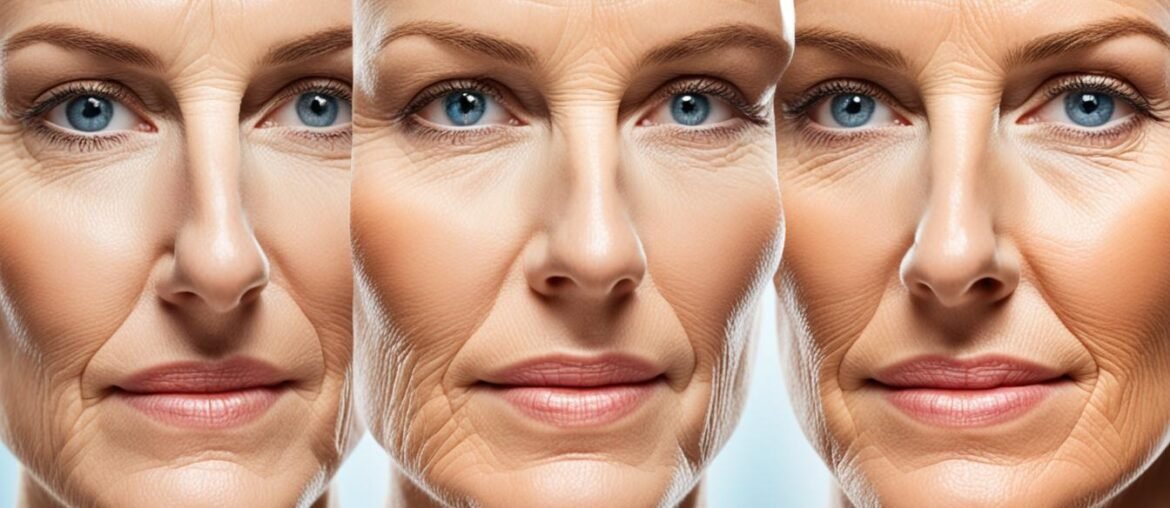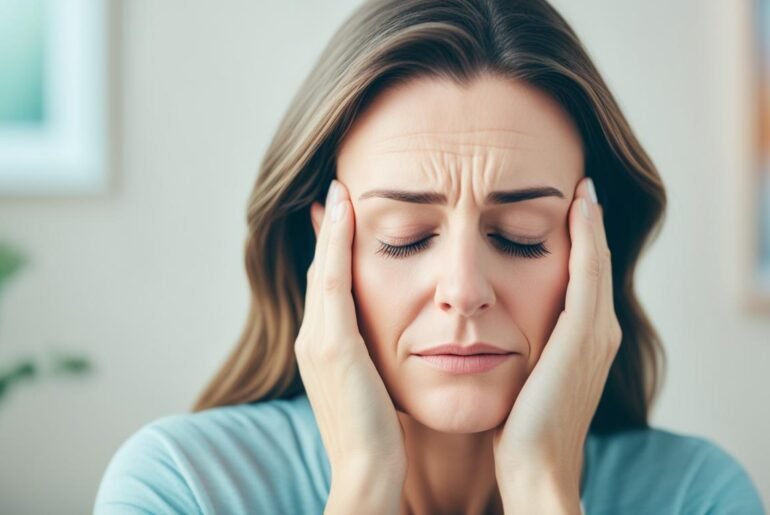Did you know that a high-stress lifestyle can make you look up to 3.5 years older? It’s true. The impact of stress on our skin is far-reaching, leading to premature aging, wrinkles, and a host of skin-related conditions. Understanding the connection between stress and skin aging is crucial in finding effective treatments and solutions to combat these effects.
Key Takeaways:
- Stress can lead to premature skin aging, causing wrinkles, fine lines, and a dull complexion.
- Chronic stress can exacerbate existing skin conditions like acne, eczema, and rosacea.
- Stress hormones, such as cortisol, disrupt collagen production and impair the skin’s ability to heal itself.
- Adopting holistic approaches to stress management, incorporating healthy lifestyle choices, and using topical treatments can help combat stress-induced skin aging.
- Seeking professional help, such as consulting with a dermatologist, can provide personalized skincare recommendations and therapies to address stress-induced skin aging.
The Effects of Stress on the Skin
Stress can have a profound impact on the health and well-being of our skin. The effects of stress on the skin can manifest in various ways, leading to stress-induced skin conditions, wrinkles, compromised skin health, and inflammation.
One of the most noticeable effects of stress on the skin is the development or exacerbation of skin conditions. Stress can trigger or worsen conditions such as acne, eczema, psoriasis, and rosacea. The hormonal changes in the body, coupled with increased inflammation, can disrupt the skin’s balance and lead to flare-ups or breakouts.
Chronic stress can also accelerate the aging process, causing the skin to develop wrinkles, fine lines, and a lackluster appearance. When we are stressed, our bodies produce cortisol, also known as the stress hormone. Elevated levels of cortisol can break down collagen, the protein responsible for maintaining the skin’s elasticity and firmness. As a result, the skin loses its natural plumpness and develops wrinkles.
In addition to the visible signs of aging, stress can also affect the overall health of the skin. Chronic stress can weaken the immune system, making the skin more susceptible to inflammation. Increased inflammation in the skin can lead to redness, irritation, and even conditions like dermatitis.
To illustrate the effects of stress on the skin, consider the following table:
| Stress Effects | Manifestations on the Skin |
|---|---|
| Increased cortisol levels | Collagen breakdown, wrinkles |
| Weakened immune system | Inflammation, redness, irritation |
| Hormonal imbalance | Acne, breakouts |
| Accelerated aging process | Fine lines, dull complexion |
Incorporating stress management techniques, adopting a healthy lifestyle, and using targeted skincare treatments can help mitigate the effects of stress on the skin. By addressing stress-induced skin conditions, wrinkles, and inflammation, we can achieve healthier, more resilient skin.
“Stress can trigger or worsen conditions such as acne, eczema, psoriasis, and rosacea.”
By understanding the effects of stress on the skin, we can make informed choices that promote skin health and well-being. In the following sections, we will delve deeper into the role of stress hormones in skin aging, explore holistic approaches to stress management, and discuss nourishing the skin from within.
The Role of Stress Hormones in Skin Aging
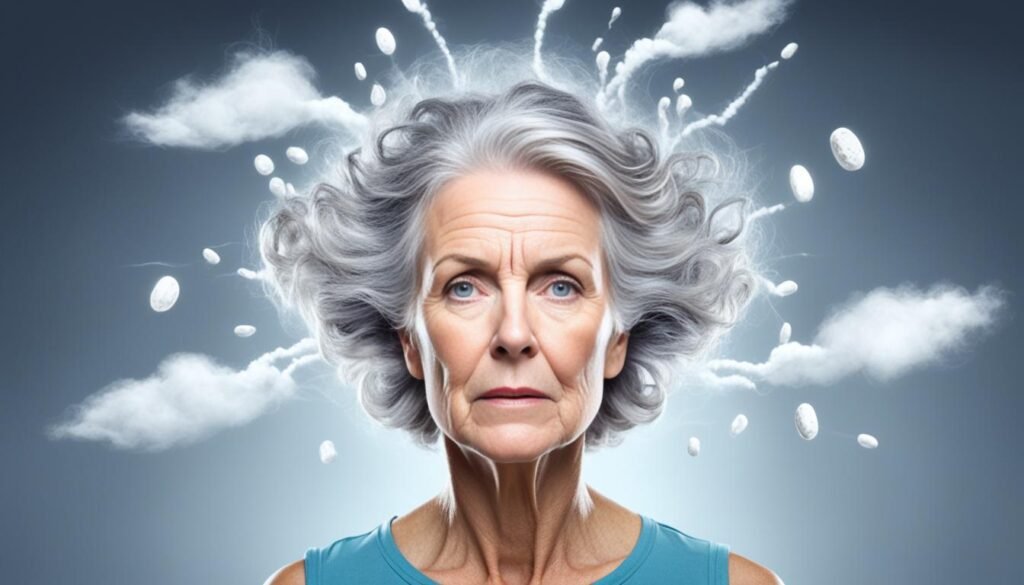
Stress hormones, particularly cortisol, play a significant role in the aging of our skin. When our bodies are under stress, they produce an increased amount of cortisol, which can have detrimental effects on our skin health. The effects of stress hormones on the skin are far-reaching, impacting various aspects of its structure and function.
The Effects of Cortisol on Collagen Production
Collagen is a protein that provides the skin with strength and elasticity. It plays a crucial role in maintaining a smooth and youthful appearance. However, elevated levels of cortisol can disrupt collagen production, leading to a loss of elasticity and the formation of wrinkles. As cortisol levels rise, collagen synthesis decreases, resulting in diminished skin elasticity and firmness.
The Impact of Stress Hormones on the Skin Barrier
The skin barrier is responsible for keeping our skin hydrated and protected, acting as a defense against external aggressors. Cortisol can negatively affect the skin’s barrier function, compromising its ability to retain moisture. This can result in increased transepidermal water loss, causing dryness and dehydration.
Impaired Skin Healing and Cell Turnover
Stress hormones can also impair the skin’s ability to heal and repair itself. When the body is under stress, the skin’s natural healing processes are disrupted, leading to a compromised skin barrier and impaired cell turnover. This can result in a dull complexion and delayed wound healing.
To illustrate the impact of stress hormones on skin aging, consider the following table:
| Effects of Stress Hormones on the Skin | Consequences |
|---|---|
| Disrupted collagen production | Loss of elasticity and formation of wrinkles |
| Compromised skin barrier function | Dryness and dehydration |
| Impaired skin healing and cell turnover | Dull complexion and delayed wound healing |
Understanding the effects of stress hormones on the skin gives us valuable insights into the mechanisms of stress-induced skin aging. It emphasizes the importance of managing stress levels and adopting a comprehensive approach to skincare that addresses both the external and internal factors contributing to skin health.
The Impact of Stress on the Mind-Body Connection
Stress not only affects the physical health of our skin but also has a profound impact on our overall well-being. The mind-body connection plays a crucial role in understanding and managing stress-induced skin aging. By addressing the underlying stressors and implementing effective stress reduction techniques, we can promote healthier skin and a more balanced state of being.
Meditation for Stress Reduction
Meditation is a powerful tool for managing stress and promoting overall wellness. By practicing mindfulness and focusing on the present moment, meditation can help calm the mind and reduce the release of stress hormones. This, in turn, can have a positive impact on our skin health.
Take a few minutes each day to find a quiet space, sit comfortably, and close your eyes. Allow your thoughts to come and go without judgment, bringing your attention back to your breath. Engaging in regular meditation can help reduce stress levels, improve mental clarity, and promote a sense of inner peace, which ultimately contributes to healthier skin.
Exercise and Skin Health
Incorporating regular exercise into your routine not only benefits your physical health but also helps reduce stress levels. Exercise promotes circulation, delivering oxygen and nutrients to the skin, while also triggering the release of endorphins, the body’s natural mood boosters.
Maintaining an active lifestyle can help alleviate stress and improve overall skin health. It doesn’t have to involve intense workouts; simple activities like walking, jogging, or practicing yoga can make a significant difference. Find an exercise routine that you enjoy and make it a priority in your daily life.
Holistic Approaches to Skin Health
“Holistic approaches to skin health emphasize the importance of addressing the underlying causes of stress and promoting overall well-being.”
In addition to meditation and exercise, holistic approaches to skin health encompass various stress reduction techniques and self-care practices. Incorporating deep breathing exercises, aromatherapy, or engaging in hobbies that bring joy and relaxation can all contribute to managing stress and promoting skin health.
| Stress Reduction Techniques | Benefits |
|---|---|
| Meditation | Calms the mind, reduces stress hormones |
| Deep breathing exercises | Promotes relaxation, lowers stress levels |
| Aromatherapy | Elevates mood, reduces anxiety |
| Engaging in hobbies | Provides joy and relaxation, distracts from stressors |
By embracing a holistic approach to skin health, we can create a harmonious balance between the mind and the body, leading to greater overall well-being and vibrant, healthy skin.
Nourishing the Skin from Within
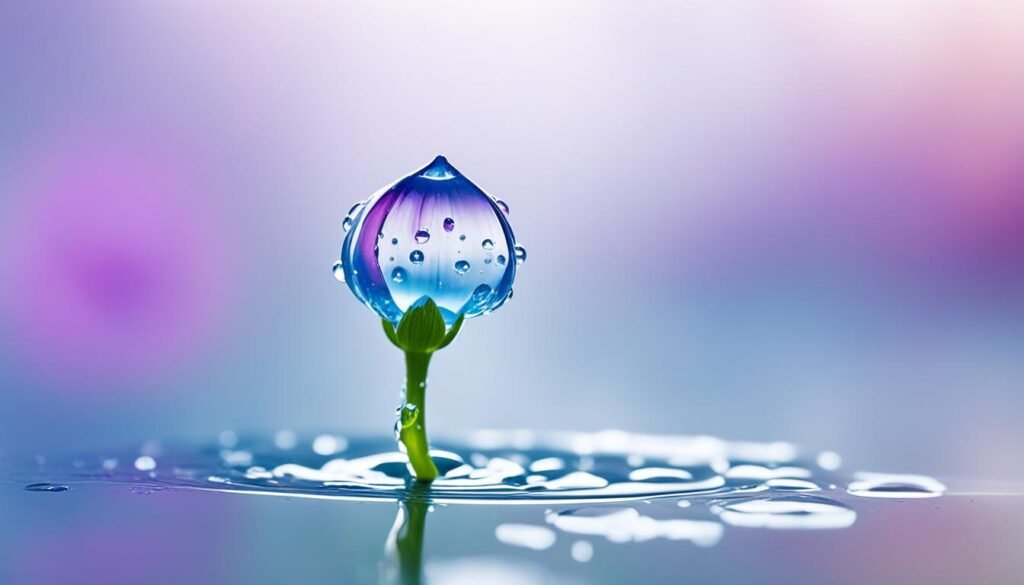
A healthy diet is essential for maintaining youthful and radiant skin, particularly in times of stress. Nourishing the skin from within involves consuming nutrient-dense, antioxidant-rich foods that support skin health. Focus on consuming a variety of fruits and vegetables, which are high in vitamins and minerals that promote collagen production and protect against oxidative damage. Hydration is also crucial, as stress can lead to increased water loss from the skin. Drinking enough water and incorporating hydrating foods can help maintain the skin’s moisture balance.
Top Stress-Reducing Foods for Youthful Skin
Incorporating stress-reducing foods into your diet can have a positive impact on your skin’s health. These foods are rich in essential nutrients and have properties that can help combat the effects of stress on the skin. Some stress-reducing foods for youthful skin include:
- Blueberries: Packed with antioxidants, blueberries help protect the skin against oxidative stress and premature aging.
- Avocado: This creamy fruit is rich in healthy fats and vitamin E, which nourish and hydrate the skin.
- Dark Chocolate: Enjoying a small amount of dark chocolate can boost serotonin levels, promoting a sense of calm and reducing stress.
- Salmon: High in omega-3 fatty acids, salmon helps reduce inflammation and keeps the skin looking supple and youthful.
- Spinach: Loaded with vitamins A and C, spinach supports collagen production and helps protect the skin from damage.
Vitamins for Skin Health
Vitamins play a crucial role in maintaining healthy skin. They help repair and protect the skin, boost collagen production, and promote a youthful complexion. Some essential vitamins for skin health include:
| Vitamin | Benefits | Food Sources |
|---|---|---|
| Vitamin C | Supports collagen production, protects against UV damage | Citrus fruits, bell peppers, strawberries |
| Vitamin E | Antioxidant properties, helps moisturize and protect the skin | Almonds, sunflower seeds, spinach |
| Vitamin A | Promotes cell turnover, supports the skin’s barrier function | Carrots, sweet potatoes, spinach |
| Vitamin D | Protects against inflammation, helps maintain skin’s immune function | Sunlight, fatty fish, fortified dairy products |
| Vitamin B3 (Niacin) | Improves skin elasticity, reduces redness and inflammation | Tuna, chicken breast, mushrooms |
Hydration is crucial for maintaining healthy skin, especially in times of stress. When we are stressed, our bodies can lose more water, leading to dehydration and dryness. To keep your skin hydrated, drink plenty of water throughout the day and consume foods with high water content, such as cucumbers, watermelon, and celery. These foods not only provide hydration but also deliver essential minerals and antioxidants to support skin health.
Topical Treatments for Stress-Induced Skin Aging
In addition to lifestyle changes and stress reduction techniques, incorporating effective topical treatments can greatly combat the signs of stress-induced skin aging. Investing in anti-aging skincare products specifically formulated for stress-induced skin aging can help address the visible effects of stress on the skin and restore a youthful glow.
When searching for skincare products to combat stress-induced skin aging, it’s essential to look for key ingredients known for their anti-aging properties. These ingredients work together to rejuvenate the skin and reduce the appearance of wrinkles and other signs of aging.
- Retinol: A powerhouse ingredient, retinol stimulates collagen production, smoothes fine lines and wrinkles, and improves skin texture. Incorporating retinol into your skincare routine can greatly benefit stress-induced skin aging.
- Neuropeptides: Expression lines caused by repetitive facial movements are a common concern in stress-induced aging. Skincare products containing neuropeptides can help target these lines and minimize their appearance, resulting in smoother and more youthful-looking skin.
- Hydrating Skincare Products: Stress can disrupt the skin’s moisture balance, leading to dryness and dehydration. Using hydrating skincare products that replenish moisture and improve the skin’s barrier function is crucial in maintaining a healthy and youthful complexion.
By incorporating these powerful ingredients into your skincare routine, you can effectively combat stress-induced skin aging and restore your skin’s vitality.
| Product | Main Benefits |
|---|---|
| Retinol Serum | Stimulates collagen production, reduces wrinkles and fine lines, improves skin texture |
| Neuropeptide Cream | Targets expression lines, smooths facial wrinkles, promotes a more youthful appearance |
| Hydrating Face Mask | Replenishes moisture, restores skin’s hydration levels, improves skin’s barrier function |
| Moisturizing Night Cream | Hydrates and rejuvenates the skin, reduces signs of aging, promotes a radiant complexion |
By incorporating these topical treatments into your skincare routine, you can effectively combat stress-induced skin aging and promote a more youthful and healthy complexion.
Holistic Approaches to Stress Management
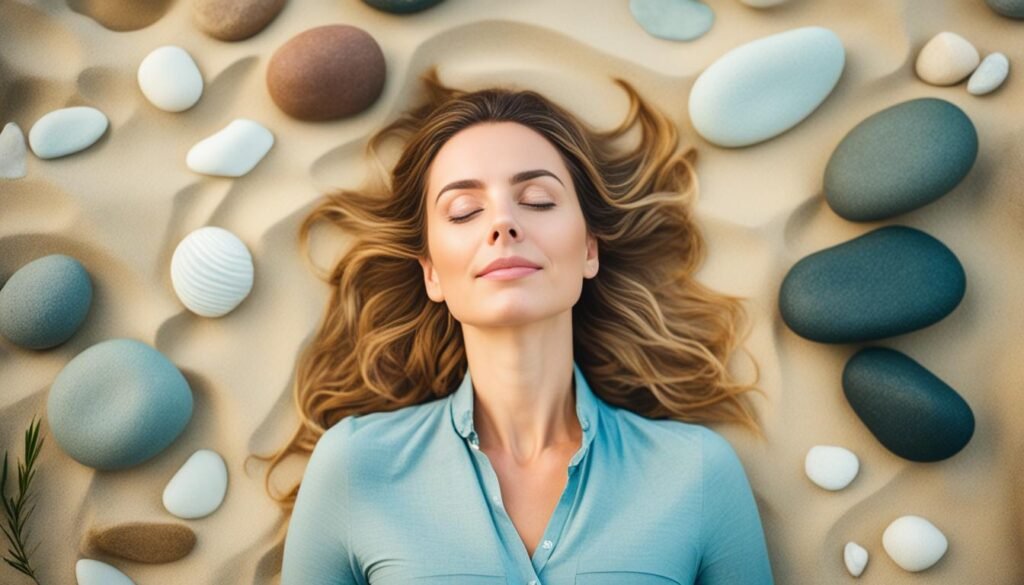
Managing stress goes beyond skincare products and includes adopting a holistic approach to stress management. Engaging in self-care practices, such as taking baths, practicing aromatherapy, or participating in activities that bring joy and relaxation, can help reduce stress levels and improve skin health. Incorporating mindfulness practices like yoga or meditation into your daily routine can also have a positive impact on both the mind and the skin.
The Power of Self-Care
Self-care is a crucial aspect of holistic stress management. Taking the time to prioritize yourself and engage in activities that promote relaxation and wellbeing can significantly reduce stress and its impact on your skin. Whether it’s indulging in a luxurious bath with calming essential oils or pampering yourself with a soothing face mask, self-care practices allow you to unwind and recharge.
“Self-care is not selfish. You cannot serve from an empty vessel.” – Eleanor Brownn
The Healing Power of Aromatherapy
Aromatherapy is a powerful tool for stress reduction. The use of essential oils derived from plants can evoke a sense of calm and relaxation, promoting overall wellbeing. Incorporate essential oils such as lavender, chamomile, or bergamot into your skincare routine or diffuse them at home to create a soothing environment.
The Mind-Body Connection: Yoga and Meditation
Yoga and meditation are ancient practices that have been shown to effectively reduce stress and promote skin health. Not only do they help to calm the mind and alleviate anxiety, but they also improve circulation and oxygenation, which nourishes the skin from within. Regular practice of yoga and meditation can contribute to a clearer complexion and a more youthful glow.
Letting Nature Heal: Spending Time Outdoors
Connecting with nature can be a powerful stress management technique. Spending time outdoors, whether it’s going for a walk in the park or simply sitting in your backyard, allows you to disconnect from the demands of daily life and find solace in the beauty of nature. Being in nature has been scientifically proven to reduce stress levels and improve overall wellbeing.
Practicing holistic stress management not only benefits your skin but also your overall well-being. By incorporating self-care practices, aromatherapy, yoga, and spending time in nature into your daily routine, you can effectively manage stress and promote healthier, more radiant skin.
Seeking Professional Help for Stress-Induced Skin Aging
If you are struggling with stress-induced skin aging, it is important to seek professional help to address your concerns effectively. A dermatologist specializing in stress-induced skin aging can provide personalized recommendations and treatments tailored to your specific needs and concerns. By working with a dermatologist, you can benefit from their expertise in identifying the root causes of your skin aging and developing a targeted treatment plan to address your unique skin concerns.
In addition to dermatological treatments, stress management programs can play a crucial role in reducing the impact of stress on your skin. These programs often incorporate a variety of techniques and therapies designed to help you manage stress more effectively. From relaxation techniques to mindfulness practices, these programs can provide you with the tools and support you need to reduce stress and improve your overall well-being.
Professional skincare treatments for aging skin can also be an effective option for managing stress-induced skin aging. These treatments go beyond traditional skincare routines, offering specialized procedures and technologies to address specific skin concerns caused by stress. Whether it’s targeted treatments to reduce wrinkles or rejuvenating treatments to improve skin tone and texture, professional skincare treatments can help you achieve healthier, more youthful-looking skin.
Lastly, therapy can be an invaluable resource for stress reduction and overall well-being. Working with a therapist can help you explore and address the underlying causes of stress, develop coping strategies, and implement positive lifestyle changes. Therapy provides a safe space for you to express your concerns, gain insight into your stress triggers, and learn effective stress management techniques.
Benefits of Professional Help for Stress-Induced Skin Aging
“Seeking professional help for stress-induced skin aging can provide you with expert guidance, personalized treatments, and comprehensive support to manage stress and improve your skin health.”
| Benefits of Seeking Professional Help for Stress-Induced Skin Aging | |
|---|---|
| Expert Advice | Access to dermatologists specializing in stress-induced skin aging who can provide tailored recommendations for your unique skin concerns. |
| Personalized Treatments | Customized skincare treatments and procedures designed to address your specific skin aging concerns caused by stress. |
| Comprehensive Support | Guidance and support in managing stress through stress management programs, therapy, and lifestyle changes. |
| Improved Skin Health | The implementation of professional skincare treatments and stress reduction techniques can lead to healthier, more youthful-looking skin. |
Seeking professional help for stress-induced skin aging allows you to access a range of resources and expertise to effectively manage stress and improve your skin health. Whether you consult with a dermatologist, participate in stress management programs, or engage in therapy, these professional avenues can provide valuable guidance and support on your journey to healthier, more resilient skin.
Embracing a Balanced and Healthy Lifestyle

A balanced and healthy lifestyle is crucial for managing stress and promoting skin health. By incorporating key factors such as quality sleep, social support, and engaging in stress-reducing activities, you can achieve a balanced lifestyle that benefits both your mind and body.
Quality Sleep for Stress Reduction
Prioritizing quality sleep is essential for regulating stress hormones and supporting the skin’s natural repair processes. Lack of sleep can result in increased cortisol levels, leading to inflammation and accelerated skin aging. Aim for 7-9 hours of uninterrupted sleep each night to promote skin rejuvenation and overall well-being.
Social Support for Stress Management
Building strong social connections and seeking support from loved ones can significantly contribute to stress reduction. Engaging in meaningful conversations, spending time with family and friends, and participating in social activities can help alleviate stress and create a sense of belonging and support.
Engaging Hobbies for Stress Reduction
Engaging in hobbies and activities that bring joy and relaxation can be an effective way to reduce stress levels. Whether it’s painting, gardening, playing a musical instrument, or practicing yoga, finding activities that you enjoy can help distract your mind from stressors and promote a sense of peace and well-being.
“Engaging in hobbies and activities that bring joy and relaxation can be an effective way to reduce stress levels.”
By embracing a balanced and healthy lifestyle that encompasses quality sleep, social connections, and stress-reducing hobbies, you can enhance your overall well-being and minimize the negative effects of stress on your skin. Remember, self-care is essential in maintaining a healthy and youthful complexion.
Conclusion
Stress-induced skin aging is a real concern that can have significant effects on the health and appearance of our skin. It is important to understand the connection between stress and skin health in order to find effective treatments and strategies for managing stress. By adopting a holistic approach that includes stress reduction techniques, healthy lifestyle choices, and appropriate skincare, we can minimize the impact of stress on our skin and promote a rejuvenated complexion.
Managing stress is key to maintaining healthier and more youthful-looking skin. Incorporating stress reduction techniques such as meditation, deep breathing exercises, and mindfulness can help improve skin health by calming the mind and reducing the release of stress hormones. Regular exercise, a balanced diet rich in antioxidants and hydration, and seeking professional help when needed, are also important steps in combating stress-induced skin aging.
Remember, taking control of your stress levels and prioritizing self-care is essential for healthier and more youthful-looking skin. By understanding the effects of stress on our skin and implementing effective strategies to manage it, we can enhance our overall well-being and promote a more radiant complexion. Embrace a balanced and healthy lifestyle to minimize the impact of stress on your skin and enjoy a rejuvenated and vibrant appearance.
FAQ
What is stress-induced skin aging?
Stress-induced skin aging refers to the negative impact that stress can have on the health and appearance of the skin. It can manifest as wrinkles, fine lines, dryness, dehydration, dullness, and the development or exacerbation of skin conditions.
How does stress affect the skin?
Stress can impact the skin in various ways. It can lead to the development of skin conditions such as acne, eczema, psoriasis, and rosacea. Chronic stress can accelerate the aging process, causing wrinkles, fine lines, and a dull complexion. Stress hormones can disrupt collagen production, compromise the skin barrier, and impair the skin’s ability to heal and repair itself.
What are some stress reduction techniques for healthier skin?
Stress reduction techniques can include meditation, deep breathing exercises, and mindfulness practices. Regular exercise and a healthy diet can also help reduce stress levels and improve skin health. Engaging in self-care practices, such as aromatherapy or participating in activities that bring joy and relaxation, can also have a positive impact on both the mind and the skin.
How can I nourish my skin from within to combat stress-induced aging?
Nourishing the skin from within involves consuming a nutrient-dense diet rich in fruits and vegetables. These foods are high in vitamins and minerals that support collagen production and protect against oxidative damage. Hydration is also crucial, so drink enough water and incorporate hydrating foods into your diet.
Are there topical treatments available for stress-induced skin aging?
Yes, there are skincare products available that can help combat stress-induced skin aging. Look for products containing ingredients such as retinol, which stimulates collagen production and reduces the appearance of wrinkles. Neuropeptides can target expression lines caused by repetitive facial movements. Hydrating skincare products can also help replenish moisture and improve the skin’s barrier function.
What are some holistic approaches to stress management?
Holistic approaches to stress management include incorporating stress reduction techniques into your daily routine, such as meditation, yoga, or deep breathing exercises. Engaging in self-care practices and activities that bring joy and relaxation can also help reduce stress levels. Additionally, maintaining a balanced lifestyle with quality sleep and social connections can contribute to overall well-being and minimize the negative effects of stress on the skin.
Should I seek professional help for stress-induced skin aging?
If stress-induced skin aging is a significant concern, it may be beneficial to seek professional help. Dermatologists can provide personalized skincare recommendations and treatments tailored to your specific needs and concerns. Stress management programs and therapies can also help address the underlying causes of stress and provide support in reducing its impact on the skin and overall well-being.
How can I embrace a balanced and healthy lifestyle to minimize stress?
Embracing a balanced and healthy lifestyle involves prioritizing quality sleep, engaging in regular exercise, and consuming a nutritious diet. Cultivating social connections and seeking support from loved ones can also contribute to stress reduction. Engaging in hobbies and activities that bring joy and relaxation can further promote overall well-being and minimize the negative effects of stress on the skin.
Is stress-induced skin aging reversible?
While it may not be possible to completely reverse all the effects of stress-induced skin aging, adopting a holistic approach to stress management, incorporating effective skincare treatments, and making lifestyle changes can help improve skin health and minimize the visible signs of aging caused by stress.

